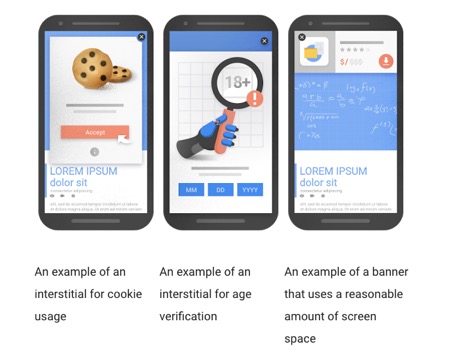
On the 10th of January 2017 Google has announced that it will be introducing a change to the current algorithm responsible for its mobile search results. From that date forward Google will start penalising pages on mobile websites that utilise intrusive interstitials and fundamentally affect the users experience.
Interstitials are pop-ups that appear automatically and block the content of the page you are trying to access until they are either dismissed or you agree to their call-to-action, such as signing up to a newsletter. This method of digital marketing has been steadily increasing in popularity over the last couple of years as a way to monetise websites; this is due to the fact that they are difficult to ignore. However moving forward if you use a popup that covers the main content when a user scrolls through a page, it is likely you will rank considerably lower in the mobile search results.
One important thing to note about this proposed change is that not all interstitials count as “intrusive”. On Google’s official Webmasters Blog there are some examples given of techniques that, when used responsibly, would not be affected by the new signal:
- Interstitials that appear to be in response to a legal obligation, such as cookie usage or for age verification.
- Login dialogs on sites where content is not publicly indexable.
- Banners that use a reasonable amount of screen space and are easily dismissible.

The interstitials that are classified as providing a poorer experience to mobile users and that restrict content access are as follows:
- Showing a popup that covers the main content, either immediately after the user navigates to a page form the search results, or while they are looking through the page.
- Displaying a standalone interstitial that the user has to dismiss before accessing the main content.
- Using a layout where the above-the-fold portion of the page appears similar to a standalone interstitial, but the original content has been inlined underneath the fold.

If all this is sounding a bit confusing don’t panic! Google has given us plenty of warning for this change and digital marketing will do what it always has done, adapt and grow. Websites will always need to run adverts, they will always need to encourage users to sign-up to newsletters and they will always need to collect data. However, now they will need to do it in a way that doesn’t affect the users experience quite so considerably.
The “Mobile Search” algorithm has always focused more on user experience rather than the traditional optimisation factors such as link authority and this is the next logical step. The response online so far has been largely positive and we will continue to follow and cover all developments as and when they happen.
